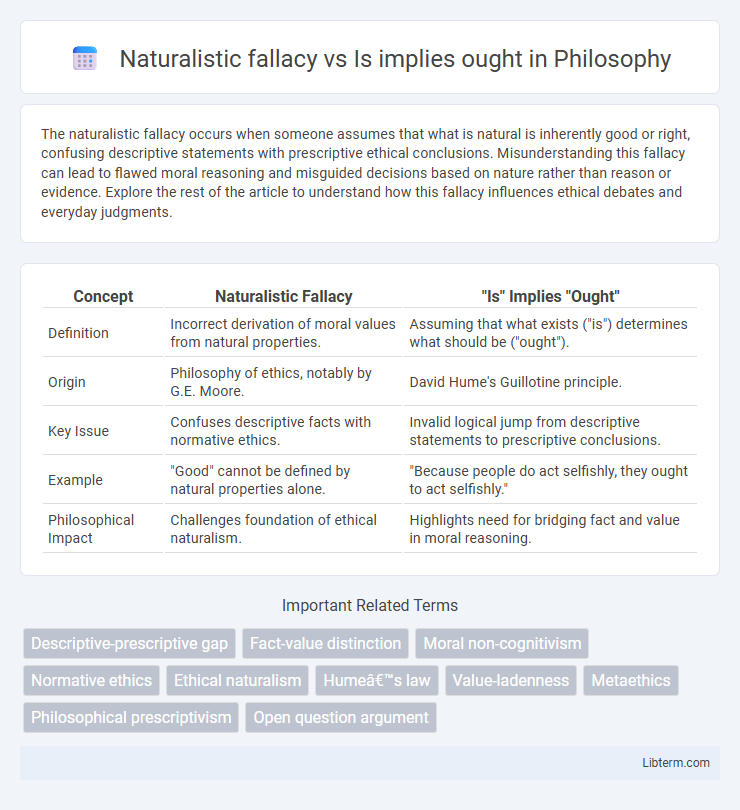The naturalistic fallacy occurs when someone assumes that what is natural is inherently good or right, confusing descriptive statements with prescriptive ethical conclusions. Misunderstanding this fallacy can lead to flawed moral reasoning and misguided decisions based on nature rather than reason or evidence. Explore the rest of the article to understand how this fallacy influences ethical debates and everyday judgments.
Table of Comparison
| Concept | Naturalistic Fallacy | "Is" Implies "Ought" |
|---|---|---|
| Definition | Incorrect derivation of moral values from natural properties. | Assuming that what exists ("is") determines what should be ("ought"). |
| Origin | Philosophy of ethics, notably by G.E. Moore. | David Hume's Guillotine principle. |
| Key Issue | Confuses descriptive facts with normative ethics. | Invalid logical jump from descriptive statements to prescriptive conclusions. |
| Example | "Good" cannot be defined by natural properties alone. | "Because people do act selfishly, they ought to act selfishly." |
| Philosophical Impact | Challenges foundation of ethical naturalism. | Highlights need for bridging fact and value in moral reasoning. |
Understanding the Naturalistic Fallacy
Understanding the Naturalistic Fallacy involves recognizing the error of deriving moral oughts directly from natural facts without justification. It challenges the assumption that what is natural inherently determines what is morally right or wrong. This fallacy highlights the distinction between descriptive statements about the world and prescriptive ethical claims.
Defining "Is Implies Ought" (Hume’s Law)
Is Implies Ought," also known as Hume's Law, asserts that one cannot logically derive prescriptive moral statements solely from descriptive factual statements. This philosophical principle highlights the gap between empirical observations about what "is" and normative claims about what "ought" to be done. Naturalistic fallacy often relates to this concept by cautioning against equating natural properties with moral values, emphasizing the distinction Hume originally identified.
Historical Origins: Moore and Hume
The Naturalistic Fallacy, coined by G.E. Moore in his 1903 work *Principia Ethica*, argues that one cannot define "good" solely through natural properties, highlighting a logical error in equating moral terms with natural facts. David Hume's earlier observation, known as the "Is-Ought Problem," from *A Treatise of Human Nature* (1739-40), emphasizes the impossibility of deriving prescriptive ethical statements directly from descriptive premises. Both concepts critically shaped meta-ethical debates by challenging the assumption that moral values can be scientifically or empirically grounded.
Key Differences Between the Two Concepts
The naturalistic fallacy involves deriving moral values directly from natural properties, erroneously equating what is natural with what is good or right. In contrast, the Is-Ought problem, articulated by David Hume, highlights the logical gap between descriptive statements about what "is" and prescriptive claims about what "ought" to be. Key differences include that the naturalistic fallacy assumes an inherent moral value in nature, while the Is-Ought problem underscores the challenge of justifying moral judgments solely based on factual descriptions.
The Role of Facts and Values in Ethics
The naturalistic fallacy conflates factual statements with moral values, mistakenly deriving an "ought" solely from an "is," whereas the "is implies ought" debate highlights the necessity of bridging empirical observations with ethical norms. Facts provide descriptive information about the world, but values introduce prescriptive guidance that facts alone cannot dictate. Distinguishing facts from values is essential in ethical reasoning to avoid invalid logical leaps and to ground moral judgments in rational justification rather than mere empirical evidence.
Common Misconceptions
The naturalistic fallacy is often misunderstood as the idea that one cannot derive an "ought" from an "is," but this confusion overlooks that it specifically refers to defining moral terms solely by natural properties. Common misconceptions conflate the naturalistic fallacy with David Hume's "is-ought" problem, which highlights the logical gap in moving from descriptive statements to prescriptive conclusions. Clarifying this distinction improves critical reasoning in ethical debates and prevents erroneous moral conclusions based on factual premises.
Examples in Contemporary Moral Debates
Naturalistic fallacy occurs when moral values are derived directly from natural properties, such as assuming "because humans are selfish, selfishness is morally acceptable," which often appears in debates on evolutionary ethics. The "is implies ought" problem, highlighted by David Hume, warns against concluding ethical prescriptions from factual statements alone, for example, arguing that "because climate change is caused by humans, we ought to change our behavior" requires additional moral reasoning beyond the scientific fact. Contemporary discussions on topics like genetic modification and animal rights illustrate these distinctions, where facts about biological traits or ecological impacts cannot solely determine moral judgments without normative premises.
Criticisms and Counterarguments
Critics of the naturalistic fallacy argue that deriving moral conclusions directly from natural facts oversimplifies ethical reasoning, ignoring complex social and cultural contexts that shape human values. Counterarguments emphasize that while "is" statements describe realities, they do not inherently prescribe "ought" actions, highlighting the logical gap identified by philosopher David Hume. Some philosophers contend that moral norms can have empirical foundations but require a robust normative framework to avoid conflating descriptive and prescriptive claims.
Relevance in Modern Ethical Philosophy
The naturalistic fallacy conflates descriptive facts with prescriptive values, erroneously deriving moral properties solely from natural ones. The "is implies ought" problem highlights the logical gap between empirical statements and normative conclusions, emphasizing the necessity for ethical justification beyond observational data. Modern ethical philosophy critically addresses this relevance by insisting on explicit normative premises to avoid invalid moral reasoning.
Conclusion: Navigating Facts and Morals
The naturalistic fallacy occurs when one derives moral conclusions directly from natural facts, assuming what is "natural" is inherently "good." Hume's is-ought problem highlights the logical gap between descriptive statements (what is) and prescriptive statements (what ought to be), emphasizing that empirical facts alone cannot dictate ethical norms. Effective moral reasoning requires critically examining this divide to navigate the relationship between factual reality and value judgments without conflating them.
Naturalistic fallacy Infographic

 libterm.com
libterm.com